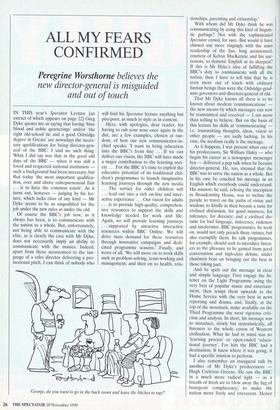ALL MY FEARS CONFIRMED
Peregrine Worsthorne believes the new director-general is misguided and out of touch
IN THIS year's Spectator Lecture [an extract of which appears on page 22] Greg Dyke quotes me as saying that having 'blue blood and noble quarterings' and/or 'the right old-school tie and a good Oxbridge degree in Greats' are nowadays the neces- sary qualifications for being director-gen- eral of the BBC. I said no such thing. What I did say was that in the good old days of the BBC — when it was still a loved and respected national institution such a background had been necessary, but that today 'the most important qualifica- tion, over and above entrepreneurial flair ... is to have the common touch'. As it turns out, however — judging by his lec- ture, which lacks class of any kind — Mr Dyke seems to be as unqualified for the job under the new rules as under the old.
Of course the BBC's job now, as it always has been, is to communicate with the nation as a whole. But, unfortunately, not being able to communicate with the elite, as is clearly the case with Mr Dyke, does not necessarily imply an ability to communicate with the masses. Indeed, apart from those accustomed to the lan- guage of a sales director delivering a pro- motional pitch, I can think of nobody who
will find his Spectator lecture anything but piss-poor, as much in style as in content.
Here, with apologies, dear reader, for having to rub your nose once again in the dirt, are a few examples, chosen at ran- dom, of how our new communicator-in- chief speaks: 'I want to bring education into the BBC's front line ... If we can deliver our vision, the BBC will have made a major contribution to the learning soci- ety ... For the BBC it's time to exploit the educative potential of its traditional chil- dren's programmes to launch imaginative learning journeys through the new media ... The service for older children will ... lead out into a rich on-line and inter- active experience ... Our vision for adults ... is to provide high-quality, comprehen- sive resources to support the skills and knowledge needed for work and life. Again, we will provide learning journeys ... supported by attractive interactive resources within BBC Online. We will drive mass demand for these resources through innovative campaigns and dedi- cated programme seasons.' Finally, and worst of all, 'We will move on to work skills such as problem-solving, team-working and management; and then on to health, rela- 'George, do you want to go in the back room and leave the bitches to rap?' tionships, parenting and citizenship.'
With whom did Mr Dyke think he was communicating by using this kind of linguis- tic garbage? Not with the sophisticated
Spectator crowd, for sure. But would it have chimed any more ringingly with the mass readership of the Sun, long accustomed,
courtesy of Kelvin MacKenzie and his suc- cessors, to demotic English at its sharpest?
If this is Mr Dyke's idea of fulfilling the BBC's duty to communicate with all the nation, then I have to tell him that he is even more out of touch with ordinary human beings than were the Oxbridge-grad- uate governors and directors-general of old.
That Mr Dyke knows all there is to be known about modern 'communications' - the new means by which messages can now be transmitted and received — I am more than willing to believe. But on the basis of
this lecture his skills at 'communicating' i.e. transmitting thoughts, ideas, vision to other people — are sadly lacking. In his case, the medium really is the message.
As it happens, I was present when one of his predecessors, Sir William Haley — who began his career as a newspaper messenger boy — delivered a pep talk when he became director-general. He, too, stressed that the BBC was to serve the nation as a whole. But in his case he couched his message in an English which everybody could understand.
His mission, he said, echoing the inscription in Broadcasting House, was to incline the people to travel on the paths of virtue and wisdom; to kindle in their breasts a taste for civilised discussion, for good manners, for tolerance, for decency; and a civilised dis- taste for bad language, indecency, rudeness and intolerance. BBC programmes, he went on, would not only preach these virtues, but also exemplify them. Its talk programmes, for example, should seek to introduce listen- ers to the pleasure to be gained from good conversation and high-class debate, under chairmen bent on bringing out the best in those taking part.
And he spelt out the message in clear and simple language. First engage the lis- tener on the Light Programme using the very best of popular music and entertain- ment, then tempt them upwards to the Home Service with the very best in news reporting and drama, and, finally, at the top of the mountain, make available on the Third Programme the most rigorous criti- cism and analysis. In short, his message was to introduce, slowly but systematically, all listeners to the whole canon of Western civilisation. What he had in mind was no 'learning process' or open-ended 'educa- tional journey'. For him the BBC had a destination. It knew where it was going; it had a specific mission to perform.
I also remember an inaugural talk by another of Mr Dyke's predecessors - Hugh Carleton Greene. He saw the BBC in a much more radical light — as a breath of fresh air to blow away the fug of bourgeois complacency; to make the nation more lively and irreverent, Hence the innovation of satire, etc. Again the staff at the BBC were left in no doubt as to where their duty lay. It was not com- munication for communication's sake, but for communicating a purpose. Of course things were simpler when the BBC still had a broadcasting monopoly and the spoken word still dominated the airwaves. But precisely because the technology has become so much more complex, the need for clarity of thought and simplicity of language in a director-general is that much greater.
So what purpose can one unravel from the extract from Mr Dyke's lecture, pub- lished today? He believes that the BBC is particularly well placed to promote 'the new learning on-line revolution'. What kind of learning? The only answer provided is that 'by using the characters from EastEnders or Grange Hill we can fire the popular imagi- nation and bring learning to people who thought education wasn't for them' and 'The Blue Peter website is full of games and further information that build on this pro- gramme, but at the click of a mouse there's a chance to go further to educative resources which explore the principles behind the submarine in an exciting and interactive way.' Apart from the obvious objection that, given the new multiple chan- nels of the digital age, children are likely to switch sideways from one fun channel to another and not upwards (and the adults likewise), Mr Dyke's horizons, as spelt out here, really are pathetically low. In any case, as he must know, given the ratings problem, BBC producers have no interest in directing viewers upwards and every interest in keep- ing them firmly where they are.
Mr Dyke is the embodiment of the prob- lems facing the BBC. Communication buffs such as Mr Dyke are the sickness rather than the cure. In any case, is it not a major scandal that the head of Britain's only pub- licly subsidised broadcasting organisation can speak only in a language which ordi- nary citizens can neither speak nor under- stand; in a language so devoid of grace and style that, were he not who he is, no editor would bother to publish it? And this in a lecture, for God's sake, on, of all subjects, education.
The BBC should aim at a standard of broadcasting which money can't buy. That much, surely, is incontrovertible. In their different ways, all the previous directors- general, starting with John Reith, and including John Birt with his mission to explain, have at least paid lip-service to this ideal. Such, however, is the muddiness of Mr Dyke's language - much worse than that of John Birt - that we really can't be sure. In the article of mine to which Greg Dyke referred at the beginning of his Spectator lecture, I ended by suggest- ing that he might be the first of a new race
of trendy, jargon-blinded, clever barbar- ians who didn't have a clue. His lecture, I have to say, has done much to confirm the worst of my fears.



























































































 Previous page
Previous page